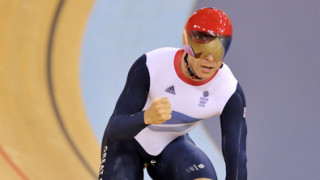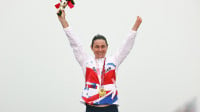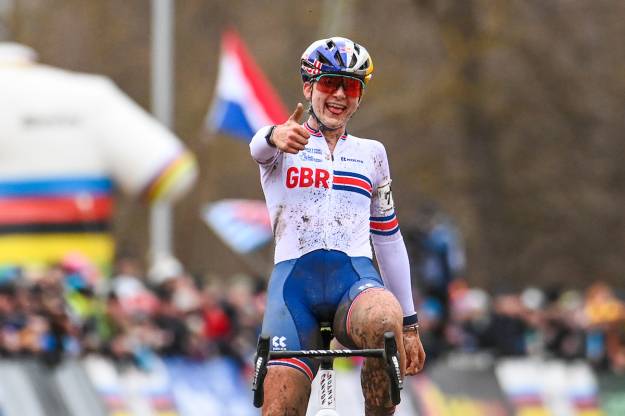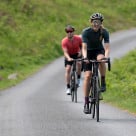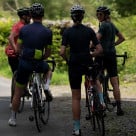| |
In the team sprint, the line between joy and despair can be impossibly fine.
For Philip Hindes, Jason Kenny and Sir Chris Hoy there were celebrations as the Great Britain trio won a gold medal and lowered the world record not once but twice during the team sprint competition.
But for Victoria Pendleton and Jessica Varnish, there was heartbreak as they fell foul of the rule governing the changeover at the end of the opening lap. Pendleton was judged to have overtaken Varnish too soon and instead of advancing to a gold medal race against China, the British team was relegated to eighth place. In the final, the Chinese infringed the same rule and saw the gold medals they thought they had won handed to the German pair.
There was drama, controversy and a clutch of world records during a thrilling opening session at the velodrome. The other highlight was a blistering world record ride in the qualifying round of the men’s team pursuit by Ed Clancy, Steven Burke, Geraint Thomas and Peter Kennaugh.
They will face Denmark in the first round tomorrow having sent an imposing message to their rivals.
But the evening belonged to Hoy and his two team-mates after they overcame a potentially disastrous start to their qualifying ride.
Philip Hindes, the 19-year-old who has burst onto the scene since the World Championships earlier this year, wobbled and lurched shortly after leaving the start gate. There appeared to be something wrong with the front end of his bike and the capacity crowd held its breath as he fell and slipped down the banking.
Hindes was handed a replacement bike and had just a few minutes to regain his composure before his second attempt at the biggest moment of his young life.
There were no problems this time as Hindes blasted his way to an opening lap of 17.505 seconds. Kenny and Hoy brought Great Britain home in 43.065 to knock the French team off the top of the leaderboard.
Ever since Jamie Staff’s retirement in the aftermath of victory in Beijing four years ago, Great Britain have been searching for someone to fill his shoes as a world-class man one. Hindes appeared to have tried them on for size at just the right moment.
France could not be underestimated, particularly after their team of Gregory Baugé, Michael D’Almeida and Kevin Sireau broke the 43-second barrier in their first round clash with New Zealand.
That seems to spur the British team on because they responded with a world record ride of 42.747 seconds as they brushed aside Japan. This time Hindes’s opening lap was a blistering 17.265 seconds.
The team sprint is all about backing up one world-class ride with another and the men were faced with just a 30-minute break between the first round and the medal races until the controversy over the women’s final caused a delay.
Britain responded better to the wait than their French opponents – they went even faster while France slipped backwards slightly.
Hindes was slower on the opening lap by the blink of an eye but as is always the case, the first lap tells only a third of the story – the aim is to get the third man over the line as quickly as possible.
And the British hit the line in a new world record time of 42.600 seconds. With the French clocking 43.013 it was emphatic a victory as is possible in the rarified environment of the team sprint.
Hoy collected the fifth gold medal of his Olympic career having won the kilometre in Athens in 2004 and a clean sweep of three sprinting victories four years ago.
Hindes only took up cycling in 2008 and two years ago he was racing for the German junior squad. His father is British and he was offered the chance to join British Cycling’s Olympic Academy Programme. Having made his international debut for Britain at the Beijing World Cup in
2011 it has been a whirlwind rise to Olympic gold medallist in little over a year.
In the bronze medal race, Germany edged out Australia.
The women’s team sprint competition saw a clutch of world records too.
Pendleton and Varnish set a new mark of 32.526 seconds in the qualifying round, although their time stood very briefly. The Chinese pair of Jinjie Gong and Shuang Guo went even faster (32.447) in the final heat.
In the first round, Great Britain cruised past Ukraine in a time that was only narrowly outside the standard set in qualification. As the Chinese broke the world record again in their heat (32.422) all eyes were fixed on the centre of the track where the judges were deep in conversation and huddled over video footage of the British race.
The result was not the one the largely home crowd wanted to hear.
Pendleton had overtaken Varnish too soon in the changeover zone and so they were relegated. The gold medal ride against China that had appeared to be on the cards was no more.
Pendleton was bitterly disappointed but philosophical – he has two more medal chances in the sprint and Keirin – but Varnish must’ve been devastated to lose guaranteed silver and her shot at gold. The rules governing the changeover are clear – and had been enforced just as strictly at the World Championships in April – but that didn’t make the decision any easier to bear.
Ukraine were defeated by the Australian team of Anna Meares and Kaarle McCulloch in the bronze medal race before a final that seemed to have crowned China deserving winners.
Having broken the world record twice, demonstrating they were the strongest pair in the competition, Gong and Guo recorded another impressive time of 32.619 seconds to see off the German team of Kristina Vogel and Miriam Welte.
The Chinese were to discover just how fine those margins can be. They were conducting their victorious post-race interviews when news filtered through that they had been relegated from gold to silver medal position for breaking the takeover rules.
Amid all the drama and uncertainty of the team sprint came a performance of metronomic beauty from the Great Britain team pursuit quartet.
It wasn’t until the Danish team of Lasse Norman Hansen, Michael Morkov, Rasmus Quaade and Casper von Folsach became the first to break the four-minute barrier than the competition began to ignite.
New Zealand went quicker, in 3-57.607, before the British took to the track.
Clancy, Burke, Thomas and Kennaugh broke the world record at the World Championships in Melbourne earlier this year.
Today they became the first team in history to go below 3-53 for the 4,000-metre race.
They stopped the clock on 3-52.499, which Australia, the final team to ride, failed to get near. In fact, the Australians looked ruffled.
They lost Glenn O’Shea early, at the 2.5km mark, and never really recovered. Nevertheless, they still rode a 3-55.694 and will not be out of it when the competition concludes on Friday.
With perfect track conditions, might it require a ride approaching 3-50 to win gold?
Britain will face Denmark in round one on Friday and will feel confident of setting one of the two fastest times to reach the gold medal final.
After that, it’s a question of how low they can go.
Results
Men's team sprint medal rides
| Gold Final | ||
| Team | Result | |
| Great Britain | 42.6 | WR |
| France | 43.013 | |
| Bronze Final | ||
| Team | Result | |
| Germany | 43.209 | |
| Australia | 43.355 |
Women's team sprint medal rides
| Gold Final | |
| Team | Result |
| Germany | 32.798 |
| China | REL |
| Bronze Final | |
| Team | Result |
| Australia | 32.727 |
| Ukraine | 33.491 |
Men's team sprint round 1
| Rank | Team | Result | |
| 1. | Great Britain | 42.747 Q | WR |
| 2. | France | 42.991 Q | |
| 3. | Germany | 43.178 Q | |
| 4. | Australia | 43.261 Q | |
| 5. | New Zealand | 43.495 | |
| 6. | China | 43.505 | |
| 7. | Russia | 43.909 | |
| 8. | Japan | 43.964 |
Women's team sprint round 1
| Rank | Team | Result | |
| 1. | China | 32.422 Q | WR |
| 2. | Germany | 32.701 Q | |
| 3. | Australia | 32.806 Q | |
| 4. | Ukraine | 33.620 Q | |
| 5. | Netherlands | 33.09 | |
| 6. | France | 33.707 | |
| 7. | Venezuela | 34.415 | |
| 8. | Great Britain | REL |
Women's team sprint qualifying
| Rank | Team | Result | |
| 1. | China | 32.447 Q | WR |
| 2. | Great Britain | 32.526 Q | |
| 3. | Germany | 32.630 Q | |
| 4. | Australia | 32.825 Q | |
| 5. | Netherlands | 33.253 Q | |
| 6. | France | 33.638 Q | |
| 7. | Ukraine | 33.708 Q | |
| 8. | Venezuela | 34.320 Q | |
| 9. | Korea | 34.636 | |
| 10. | Colombia | 34.87 |
Men's team sprint qualifying
| Rank | Team | Result | |
| 1. | Great Britain | 43.065 Q | OR |
| 2. | France | 43.097 Q | |
| 3. | Australia | 43.377 Q | |
| 4. | Russia | 43.681 Q | |
| 5. | Germany | 43.710 Q | |
| 6. | China | 43.751 Q | |
| 7. | New Zealand | 44.175 Q | |
| 8. | Japan | 44.324 Q | |
| 9. | Venezuela | 44.654 | |
| 10. | Poland | 44.712 |
Men's team pursuit qualifying
| Rank | Team | Result | |
| 1 | Great Britain | 3:52.499 Q | WR |
| 2 | Australia | 3:55.694 Q | |
| 3 | New Zealand | 3:57.607 Q | |
| 4 | Denmark | 3:58.298 Q | |
| 5 | Russia | 3:59.264 Q | |
| 6 | Spain | 4:02.113 Q | |
| 7 | Colombia | 4:03.712 Q | |
| 8 | Netherlands | 4:03.818 Q | |
| 9 | Belgium | 04:04.1 | |
| 10 | Korea | 04:07.2 |
Let us know your thoughts on the race by commenting below.

